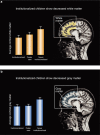Early Adverse Experiences and the Developing Brain
- PMID: 26334107
- PMCID: PMC4677140
- DOI: 10.1038/npp.2015.252
Early Adverse Experiences and the Developing Brain
Abstract
Children exposed to various forms of adversity early in life are at increased risk for a broad range of developmental difficulties, affecting both cognitive and emotional adjustment. We review a growing body of evidence suggesting that exposure to adverse circumstances affects the developing brain in ways that increase risk for a myriad of problems. We focus on two forms of adversity, one in which children are exposed to childhood maltreatment in family environments, and another in which children are exposed to extreme psychosocial deprivation in contexts of institutional rearing. We discuss ways in which each of these experiences represent violations of species-expected caregiving conditions, thereby imposing challenges to the developing brain. We also review emerging data pointing to the effectiveness of early intervention in remediating neurodevelopmental consequences associated with maltreatment or institutional rearing. We conclude by discussing implications of this work for public health efforts and highlight important directions for the field.
Figures



References
-
- Anderson CM, Teicher MH, Polcari A, Renshaw PF (2002). Abnormal T2 relaxation time in the cerebellar vermis of adults sexually abused in childhood: potential role of the vermis in stress-enhanced risk for drug abuse. Psychoneuroendocrinology 27: 231–244. - PubMed
-
- Arbel Y, Donchin E (2009). Parsing the componential structure of post-error ERPs: a principal component analysis of ERPs following errors. Psychophysiology 46: 1179–1189. - PubMed
-
- Barry RJ, Johnstone SJ, Clarke AR (2003). A review of electrophysiology in attention-deficit/hyperactivity disorder: II. Event-related potentials. Clin Neurophysiol 114: 184–198. - PubMed
Publication types
MeSH terms
Grants and funding
LinkOut - more resources
Full Text Sources
Other Literature Sources
Medical

